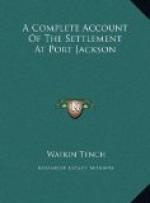Reached Ruse’s farm,* and begged to look at his grant, the material part of which runs thus: “A lot of thirty acres, to be called Experiment Farm; the said lot to be holden, free of all taxes, quit-rents, &c. for ten years, provided that the occupier, his heirs or assigns, shall reside within the same, and proceed to the improvement thereof; reserving, however, for the use of the crown, all timber now growing, or which hereafter shall grow, fit for naval purposes. At the expiration of ten years, an annual quit-rent of one shilling shall be paid by the occupier in acknowledgment.”
[See the state of this farm in my former Rose Hill journal of November 1790, thirteen months before.]
Ruse now lives in a comfortable brick house, built for him by the governor. He has eleven acres and a half in cultivation, and several more which have been cleared by convicts in their leisure hours, on condition of receiving the first year’s crop. He means to cultivate little besides maize; wheat is so much less productive. Of the culture of vineyards and tobacco he is ignorant; and, with great good sense, he declared that he would not quit the path he knew, for an uncertainty. His livestock consists of four breeding sows and thirty fowls. He has been taken from the store (that is, has supplied himself with provisions) for some months past; and his wife is to be taken off at Christmas, at which time, if he deems himself able to maintain a convict labourer, one is to be given to him.
Crossed the river in a boat to Robert Webb’s farm. This man was one of the seamen of the ‘Sirius’, and has taken, in conjunction with his brother (also a seaman of the same ship) a grant of sixty acres, on the same terms as Ruse, save that the annual quit-rent is to commence at the expiration of five years, instead of ten. The brother is gone to England to receive the wages due to them both for their services, which money is to be expended by him in whatever he judges will be most conducive to the success of their plan. Webb expects to do well; talks as a man should talk who has just set out on a doubtful enterprise which he is bound to pursue. He is sanguine in hope, and looks only at the bright side of the prospect. He has received great encouragement and assistance from the governor. He has five acres cleared and planted with maize, which looks thriving, and promises to yield a decent crop. His house and a small one adjoining for pigs and poultry were built for him by the governor, who also gave him two sows and seven fowls, to which he adds a little stock of his own acquiring.
Near Webb is placed William Read, another seaman of the ‘Sirius’, on the same terms, and to whom equal encouragement has been granted.
My survey of Rose Hill is now closed. I have inspected every piece of ground in cultivation here, both public and private, and have written from actual examination only.
But before I bade adieu to Rose Hill, in all probability for the last time of my life, it struck me that there yet remained one object of consideration not to be slighted: Barrington had been in the settlement between two and three months, and I had not seen him.




